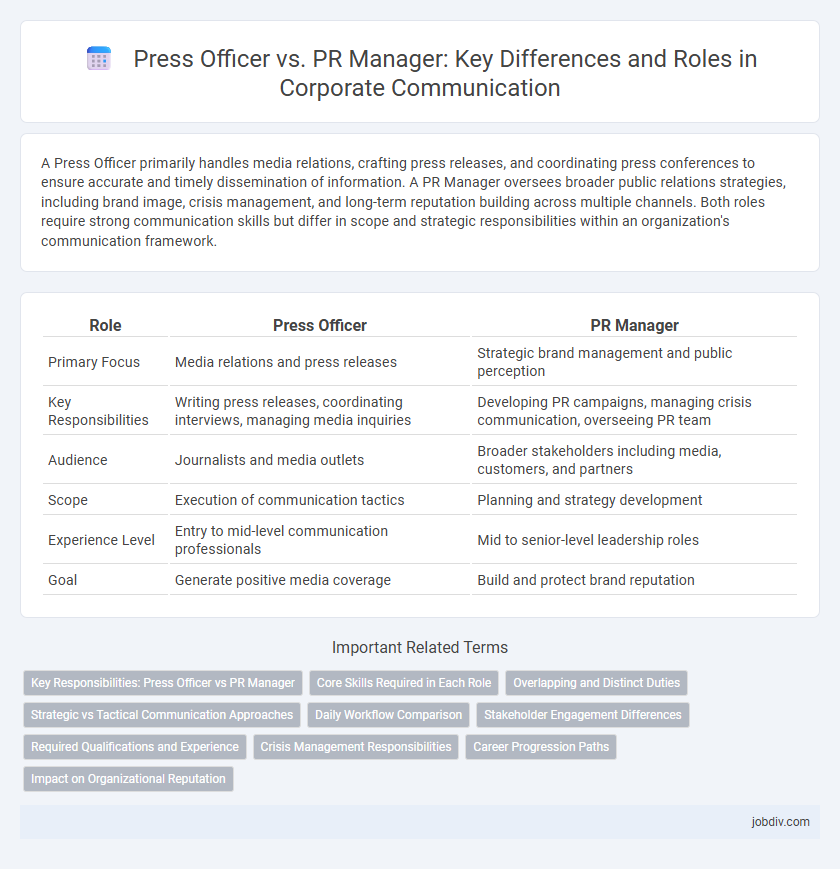A Press Officer primarily handles media relations, crafting press releases, and coordinating press conferences to ensure accurate and timely dissemination of information. A PR Manager oversees broader public relations strategies, including brand image, crisis management, and long-term reputation building across multiple channels. Both roles require strong communication skills but differ in scope and strategic responsibilities within an organization's communication framework.
Table of Comparison
| Role | Press Officer | PR Manager |
|---|---|---|
| Primary Focus | Media relations and press releases | Strategic brand management and public perception |
| Key Responsibilities | Writing press releases, coordinating interviews, managing media inquiries | Developing PR campaigns, managing crisis communication, overseeing PR team |
| Audience | Journalists and media outlets | Broader stakeholders including media, customers, and partners |
| Scope | Execution of communication tactics | Planning and strategy development |
| Experience Level | Entry to mid-level communication professionals | Mid to senior-level leadership roles |
| Goal | Generate positive media coverage | Build and protect brand reputation |
Key Responsibilities: Press Officer vs PR Manager
A Press Officer primarily handles media relations, drafting press releases, and managing press conferences to ensure clear and timely communication of an organization's news. A PR Manager oversees broader strategic planning, including brand reputation management, crisis communication, and coordinating marketing campaigns across multiple channels. While Press Officers focus on implementing communication tactics, PR Managers develop and supervise comprehensive public relations strategies.
Core Skills Required in Each Role
Press Officers require strong media relations expertise, excellent verbal communication, and the ability to craft clear, concise press releases that engage journalists and target audiences effectively. PR Managers need advanced strategic planning skills, proficiency in crisis management, and a deep understanding of brand positioning to guide overall public relations campaigns and maintain corporate reputation. Both roles demand adaptability, attention to detail, and proficiency in digital communication tools to optimize message delivery and stakeholder engagement.
Overlapping and Distinct Duties
Press Officers primarily handle media relations and the distribution of press releases, ensuring accurate and timely communication with journalists. PR Managers develop broader communication strategies, managing brand reputation and coordinating campaigns across multiple channels. Both roles require strong storytelling skills, but PR Managers engage more in strategic planning, while Press Officers focus on immediate media interaction.
Strategic vs Tactical Communication Approaches
Press Officers primarily execute tactical communication tasks such as managing media inquiries, drafting press releases, and coordinating immediate responses to public issues. PR Managers focus on strategic communication by developing long-term plans that align with organizational goals, cultivating relationships with key stakeholders, and enhancing brand reputation. The strategic approach of PR Managers guides overall messaging frameworks, while Press Officers ensure precise implementation during daily communications.
Daily Workflow Comparison
Press Officers primarily handle day-to-day media relations, drafting press releases, coordinating interviews, and responding to media inquiries to ensure timely and accurate information dissemination. PR Managers oversee strategic communication plans, manage cross-departmental campaigns, and analyze public perception data to align messaging with organizational goals. Both roles require strong communication skills, but Press Officers focus on immediate media engagement while PR Managers emphasize long-term brand reputation management.
Stakeholder Engagement Differences
A Press Officer primarily handles media relations by crafting press releases and managing journalist inquiries, ensuring accurate information reaches the public efficiently. In contrast, a PR Manager engages a broader range of stakeholders, including employees, investors, and community groups, developing strategic communication plans to build long-term relationships. The PR Manager's role emphasizes proactive engagement and reputation management across diverse audiences, whereas the Press Officer focuses on reactive media communication.
Required Qualifications and Experience
A Press Officer typically requires a bachelor's degree in communications, journalism, or public relations, along with 2-3 years of experience in media relations and press release writing. PR Managers often hold advanced degrees and possess 5-7 years of experience in strategic communication, brand management, crisis communication, and leading PR campaigns. Strong skills in media networking, content creation, and stakeholder engagement are essential for both roles, with PR Managers expected to demonstrate leadership and strategic planning expertise.
Crisis Management Responsibilities
Press Officers focus on managing media relations and delivering timely, accurate information during crises to maintain public trust. PR Managers develop comprehensive crisis communication strategies, coordinate internal and external messaging, and oversee reputation recovery efforts post-crisis. Both roles require expertise in stakeholder engagement and rapid response to mitigate negative impacts on an organization's image.
Career Progression Paths
Press Officers often begin their careers handling media relations and drafting press releases, gaining foundational skills in communication and crisis management. PR Managers typically advance from such roles, expanding responsibilities to strategic planning, brand management, and overseeing broader communication campaigns. Career progression usually involves moving from tactical execution as a Press Officer to strategic leadership and team management as a PR Manager, reflecting increased expertise and organizational influence.
Impact on Organizational Reputation
A Press Officer primarily manages media relations by crafting press releases and coordinating interviews, directly influencing how the organization is portrayed in news outlets. A PR Manager adopts a broader strategic role, overseeing reputation management, crisis communication, and stakeholder engagement to shape the organization's public image comprehensively. Effective collaboration between both roles enhances organizational credibility, trust, and long-term brand equity.
Press Officer vs PR Manager Infographic

 jobdiv.com
jobdiv.com